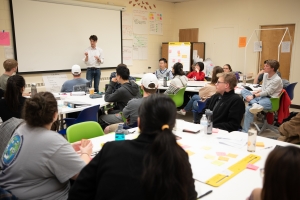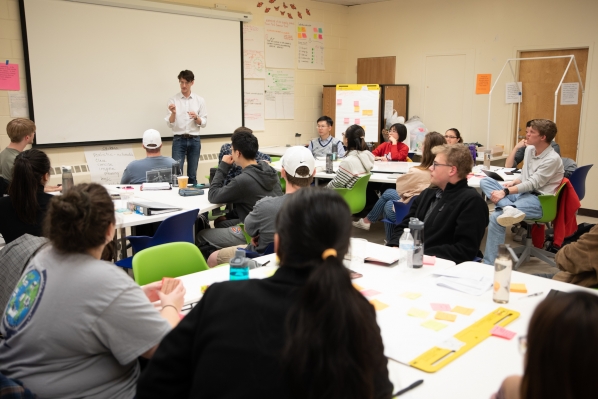Education at Appalachian State University means preparing students to live as engaged global citizens working to create a sustainable future for all. A recent collaboration between the Walker College of Business’s Holland Fellows program and College of Fine and Applied Arts faculty focused on design thinking is offering a group of students a unique opportunity to do just that.
The Holland Fellows, a group that includes 12 Appalachian students and 12 students from the University of Fudan in Shanghai, is an annual six-month international impact exchange program that provides students with the tools and strategies to develop breakthrough business models.
The 24 students collaborate both in-person and remotely throughout each spring semester on a faculty-introduced challenge, and eventually present their findings at the annual Shanghai Forum in May. Every March, the Chinese students spend several days in Boone with their Appalachian counterparts, and Holland Fellows program’s director, Walker College of Business Lecturer Jesse Pipes, introduced a different collaboration method during their visit this year.
“I wanted to breathe new life into the program,” he shared. “Traditionally, the students write a paper and give a Power Point presentation together. What I started to realize – what really created the essence of this program, which is the long-term relationships that the students have with each other – was the challenge of working on something together. I was interested in changing the format so that it’s something they don’t do in every other class.”
Pipes enlisted the assistance of D. Jason Miller, AIA, an associate professor in the Department of Sustainable Technology and the Built Environment, to plan and facilitate a week-long design thinking sprint workshop. The students were challenged to focus on plastics – primarily plastic waste – and how to change the outcome of waste by replacing, eliminating or recycling.
According to Miller, the sprint workshop structure presented an opportunity to model the challenge solution through the working process.
“Design thinking is predicated on establishing critical and creative feedback loops between research, ideation, and prototyping potential solutions for a particular problem. Iteration is paramount to that process,” he said. “Using design thinking methods afforded the students a new approach to problem solving, one that fit neatly into the problem space of changing linear plastic economies into circular ones. We sought to change ‘lines’ into ‘loops,’ and I feel this immersive process certainly aided the business product.”
As an additional challenge, Pipes and Miller banned the use of technology during the group’s working sessions. According to Pipes, this required students to apply their preexisting knowledge to the topic and encourage conversation, collaboration and idea-sharing.
Sophomore international business and global studies major Molly Campillo enjoyed the flexibility and creativity the students had as part of the project. Her group drafted a business plan that includes an app designed to reward customers who consistently use reusable mugs when visiting coffee shops. She says that the idea is to build in not only a rewards system, but an added level of convenience — in the form of mug stickers linked to customers’ credit cards for easy payment — to grow the app’s audience.
“It feels very much like an actual scenario where we’re trying to create something, rather than it being a project with specific guidelines,” she shared. “Often, in a group assignment, you split up the work so you know what’s going on in your part but not necessarily in everyone else’s. We were all fully involved in the entirety of the project.”
Both Walker College of Business and the College of Fine and Applied Arts prioritize helping students find solutions to global challenges. To this end, Pipes is encouraged by the student response to the experience. He says that the students are working well in small groups, and they are taking part in new activities together – like skydiving – outside of the planned curriculum.
“Our number one priority with the program is to provide an experiential educational opportunity that changes their worldview and teaches them how to execute their ideas,” he said. “Ideally, we’ll change the way the students see the world, how they work together and how they see their place in the world.”
About the William R. Holland Fellows Program
The Holland Fellowship is an applied business experience in Asia, with an emphasis on student research, engagement and innovation. The fellowship serves to advance global learning while promoting research and collaboration among the college’s top undergraduate students, faculty and Fudan University in Shanghai, China. A 20+ year partnership with Fudan University provides the foundation for an experience that creates a context for understanding how regions, nations and peoples might collaborate for mutual benefit in a global business environment.
About the Department of Sustainable Technology and the Built Environment
One of seven departments housed in the College of Fine and Applied Arts, the Department of Sustainable Technology and the Built Environment at Appalachian State University features an integrated array of programs spanning the fields of sustainable design and technology. Its mission is to foster a strong and vibrant culture of inquiry, discovery and innovation that integrates theory with application, problem seeking with problem-solving, local issues with global perspectives and technological progress with environmental stewardship. It offers bachelor’s degrees in sustainable technology and building science, and a master’s degree in technology.
About the Walker College of Business
The Walker College of Business at Appalachian State University delivers transformational educational experiences that prepare and inspire students to be ethical, innovative and engaged business leaders who positively impact our community, both locally and globally. The college places emphasis on international experiences, sustainable business practices, entrepreneurial programs and real-world applications with industry. Enrolling approximately 3,000 undergraduates in 10 majors and 175 graduate students in three master's programs, the Walker College is accredited by AACSB International – the premier global accrediting body for schools of business. Learn more at https://business.appstate.edu.

